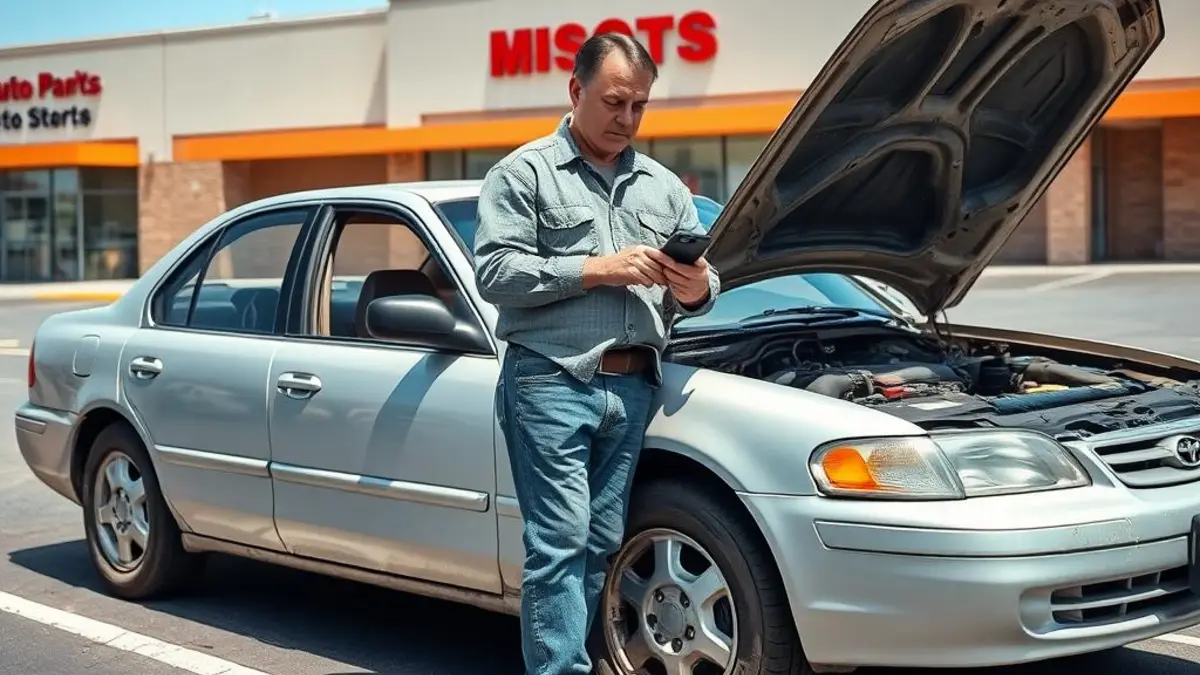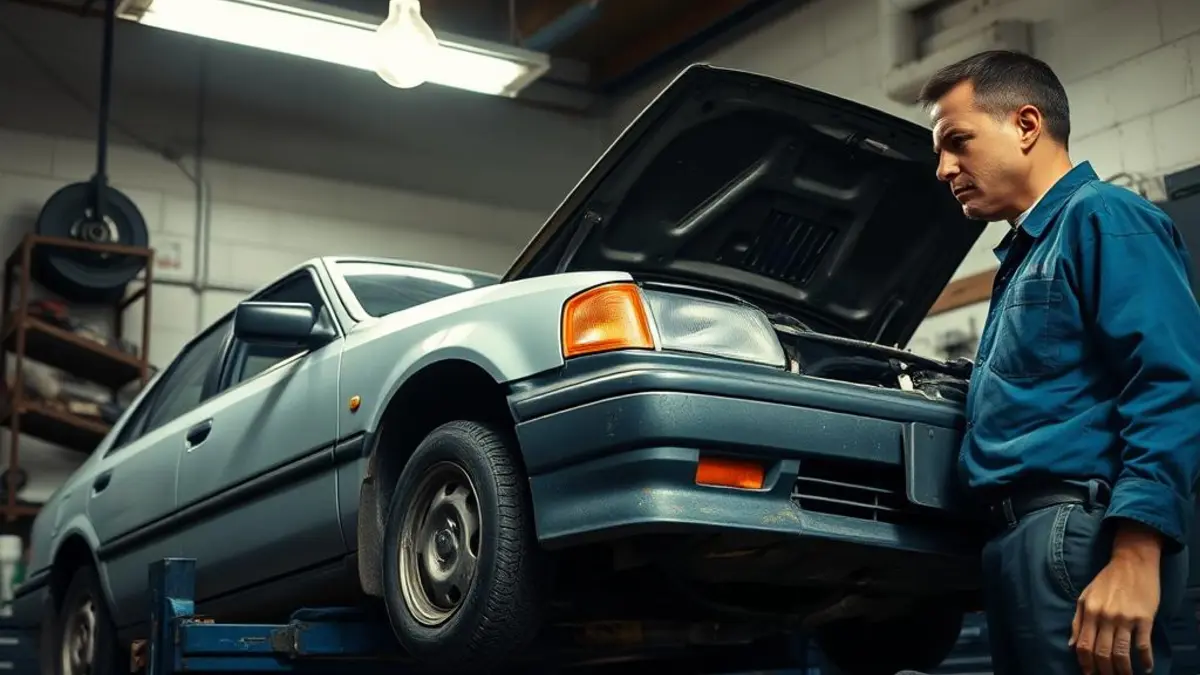How to Sell a Car with Mechanical Issues: A Quick & Safe Step-by-Step Guide
Estimated reading time: 4 minutes
Selling a car with mechanical issues can feel overwhelming. The good news is that with the right approach, you can still find a buyer and get a fair price.
This guide walks you through each step of selling a problematic vehicle while staying legal, ethical, and safe.
From disclosure requirements to finding the right buyer, we’ll cover everything you need to sell your car with mechanical issues quickly and confidently. If you’re facing the dilemma of whether to repair or replace your car, you might find this Repair vs Replace Threshold helpful.
Key Takeaways
- Transparency is key: Disclose all known mechanical issues to avoid legal problems.
- Assess the car’s condition accurately to set realistic price expectations.
- Gather all necessary paperwork, including the title, registration, and repair records.
- Explore different selling options, such as online car buyers, salvage yards, or private sales.
- Prioritize safety during the transaction, especially when dealing with private buyers.
Navigate to What Matters

Legal and Ethical Requirements When Disclosing Defects
When you sell a car with mechanical problems, transparency isn’t just good practice, it’s often legally required. Failing to disclose defects when selling a car can lead to serious consequences:
- Legal risks: You could face fraud claims, lawsuits, and financial penalties if you hide known issues.
- Contract cancellation: Buyers can void the sale if they discover undisclosed problems.
- Reputation damage: Online reviews and word-of-mouth can affect your ability to sell anything in the future.
To protect yourself, use this comprehensive disclosure checklist:
- Engine problems (misfires, leaks, noises)
- Transmission issues (slipping, grinding)
- Brake system faults
- Electrical system problems
- Safety equipment status (airbags, seatbelts)
- Past accidents and repairs
- Outstanding recalls
“Remember, selling a car with known problems is completely legal. Not disclosing those problems is where sellers get into trouble.“
[Source: A Guide to Selling a Car with Engine Problems Online]
Assessing Your Car’s Condition
Before listing your car for sale, you need a realistic understanding of its mechanical issues:
- Document visible problems with clear photos of damage, warning lights, and leaks.
- Get a professional assessment from a trusted mechanic who can provide a written report of all issues.
- Research repair costs to understand what fixes would cost a potential buyer. Consider model-specific repair costs can be found on the Engine Replacement Cost for [Model-Year] [Model] page.
- Check market values for similar vehicles in both good and poor condition to set realistic expectations.
When you sell a car with mechanical issues, understanding the severity of the problems helps determine your best selling strategy. Minor issues like a check engine light might reduce your price slightly, while major problems like transmission failure might make your car a candidate for specialized buyers.
Potential buyers will appreciate your honesty, and you’ll avoid wasting time with unrealistic price expectations.
[Source: A Guide to Selling a Car with Engine Problems Online]
Gathering Required Documentation
Proper paperwork is essential when you sell a car with mechanical issues. Having everything organized shows buyers you’re serious and trustworthy:
Essential documents to prepare:
- Clean, signed title (without liens)
- Current registration
- Maintenance and repair records
- Vehicle history report (optional but helpful)
- Written disclosure of known issues
Photo documentation tips:
- Take clear, well-lit photos of the exterior from multiple angles
- Capture interior condition honestly
- Document visible damage or problem areas
- Include photos of dashboard warning lights
- Photograph the odometer reading
Organizing your maintenance history chronologically helps buyers understand the car’s history and may show you’ve been proactive with maintenance despite current issues. A car that’s “Not Worth Fixing?” might benefit from a 7-Point Breakeven Check to decide how to proceed.
[Source: Sell a Car with Mechanical Problems in Los Angeles]
Where to Sell: Comparing Your Options
Finding the best place to sell a broken car depends on how quickly you need to sell and how much money you hope to get:
Online Car Buyers (Carvana, CarBrain, Peddle)
- Pros: Quick process, free towing, buy cars in any condition
- Cons: Typically offer lower amounts than private sales
- Best for: Non-running vehicles, quick sales without hassle
Salvage Yards and Junkyards
- Pros: Will take severely damaged vehicles, immediate payment
- Cons: Lowest payment option, often based just on scrap metal value
- Best for: Cars with catastrophic damage or very high repair costs
Private Sales
- Pros: Potentially highest payout, direct negotiation
- Cons: Time-consuming, may attract scammers, requires meeting strangers
- Best for: Cars with minor issues that are still drivable
“For most sellers with mechanically troubled vehicles, specialized online buyers offer the best balance of convenience and fair pricing, especially if your car isn’t running reliably.“
Readers facing major powertrain repairs may find this helpful: Transmission vs Engine Fix: When to Walk Away
[Source: How to Sell a Car With Mechanical Problems]
Getting Fast Cash Offers
To get the best instant cash offer with issues, follow these steps:
- Gather multiple quotes from different buyers to compare offers
- Use online instant quote tools from companies like CarBrain, Peddle, or Cash For Cars
- Be honest about conditions when submitting information
- Compare offers side-by-side considering:
- Purchase price
- Free towing inclusion
- Paperwork assistance
- Payment method and speed
When negotiating with buyers:
- Reference market values for similar vehicles
- Highlight any recent repairs or maintenance
- Be willing to walk away from lowball offers
- Consider the convenience factor of free towing and quick sales
Most online buyers can provide an offer within minutes and complete the purchase within 24-48 hours, making them ideal for sellers who need quick cash. Before making a decision, it’s helpful to understand realistic transmission rebuild costs, specific to your : Transmission Rebuild Cost for [Model-Year] [Model]
[Source: Selling a Car with Mechanical Problems]
Ensuring a Safe Transaction
Safety should be your priority when selling a car with mechanical issues, especially with private buyers:
Red flags to watch for:
- Buyers who refuse to meet at public locations
- Those who won’t inspect the car before offering payment
- Requests to ship the car to another location before payment
- Offers that seem too good to be true
- Cashier’s checks for more than the asking price
Secure payment methods:
- Cash (for smaller amounts)
- Cashier’s checks (verify with the bank before transferring title)
- Electronic transfers through your bank
- Payment escrow services
When meeting buyers, choose public locations like bank parking lots during daylight hours, bring a friend when possible, and trust your instincts if something feels wrong. Recognizing the importance of using the Correct Approach or Resource for any problem is key, as discussed in the article: The Right Tool for Every Problem: A Lesson from My Facade
Finalizing the Sale Legally
The final step to disclose defects when selling a car is proper documentation:
- Create a detailed bill of sale including:
- Complete vehicle identification (VIN, make, model, year)
- Your name and the buyer’s name with signatures
- Sale price and date
- “As-is” statement
- List of known mechanical issues
- Transfer the title properly according to your state’s requirements:
- Complete seller’s sections
- Have buyer complete their sections
- Remove license plates (in most states)
- Submit transfer notification to DMV
- Keep copies of everything for your records in case questions arise later
Different states have varying requirements for title transfers and sales documentation, so check your local DMV website for specific guidance.
[Source: Sell a Car with Mechanical Problems in Los Angeles]
Conclusion
Selling a car with mechanical issues doesn’t have to be stressful when you follow these steps. Remember that honesty about your vehicle’s condition protects you legally while building trust with potential buyers. Thorough documentation of both the car’s problems and the sales transaction keeps the process smooth.
Whether you choose to sell to a specialized buyer for convenience or pursue a private sale for potentially more money, proper preparation makes all the difference. By disclosing defects properly, gathering the right paperwork, and ensuring secure transactions, you can successfully sell your car with mechanical issues while getting a fair price and avoiding future headaches.
FAQ
Q: Is it legal to sell a car with mechanical problems?
A: Yes, it is legal as long as you fully disclose all known issues to the buyer.
Q: What if I don’t know all the problems with the car?
A: It’s best to get a professional mechanic to inspect the car before selling to identify any hidden issues.
Q: Can I sell a car with a salvaged title?
A: Yes, but be prepared to sell it for significantly less than a car with a clean title. Disclose the salvage title status upfront.
Q: What’s an “as-is” sale?
A: Selling a car “as-is” means the buyer accepts the car in its current condition, with all faults, and you are not responsible for any repairs after the sale.
Q: What happens if I don’t disclose a problem and the buyer finds out later?
A: You could face legal action, including lawsuits for fraud or misrepresentation. It’s always best to be honest and upfront.
-

 Best Picks1 year ago
Best Picks1 year agoDriving Insurance: Get the Best Car Coverage Without Overpaying
-

 Best Rewards7 months ago
Best Rewards7 months agoBest rewards credit cards in 2025 for everyday use
-

 Personal Growth & Mindset1 year ago
Personal Growth & Mindset1 year agoTed Lasso Effect: 5 Goal-Setting Secrets You Must Know
-

 Personal Growth & Mindset1 year ago
Personal Growth & Mindset1 year agoMachado de Assis: This Viral TikTok Explains Why You Need to Read ‘The Posthumous Memoirs of Brás Cubas’ Now
-

 Career & Success1 year ago
Career & Success1 year agoChallenges of Not Having Goals: 5 tips to help you get started
-

 AI & Future Trends1 year ago
AI & Future Trends1 year agoAI in Time Management 2024: A New Era of Productivity for Business Leaders








